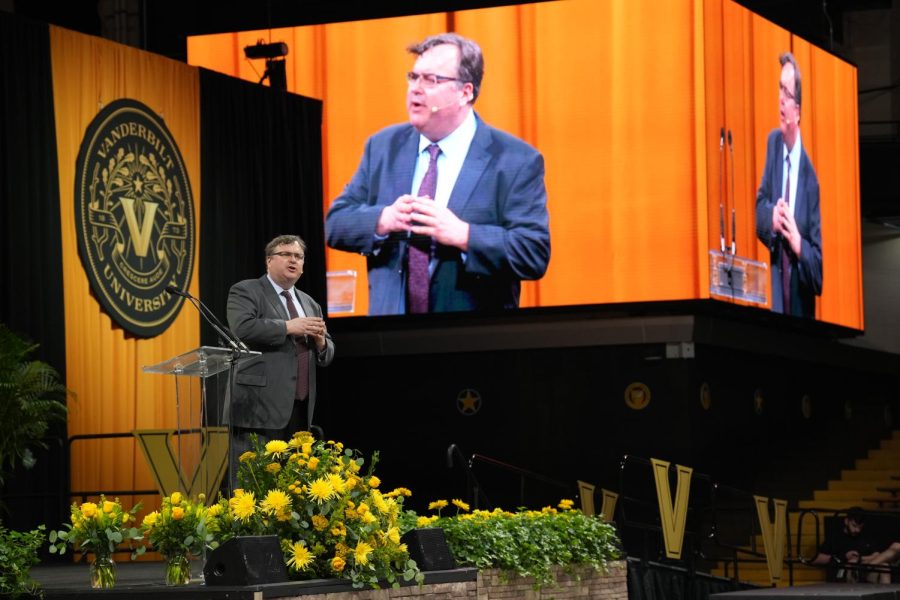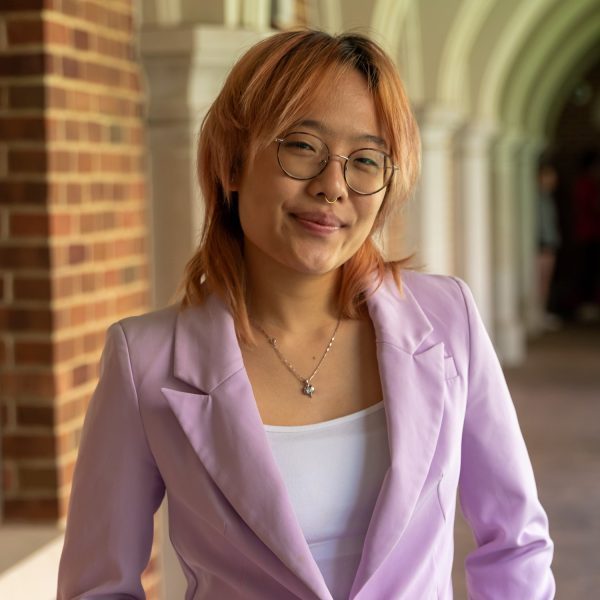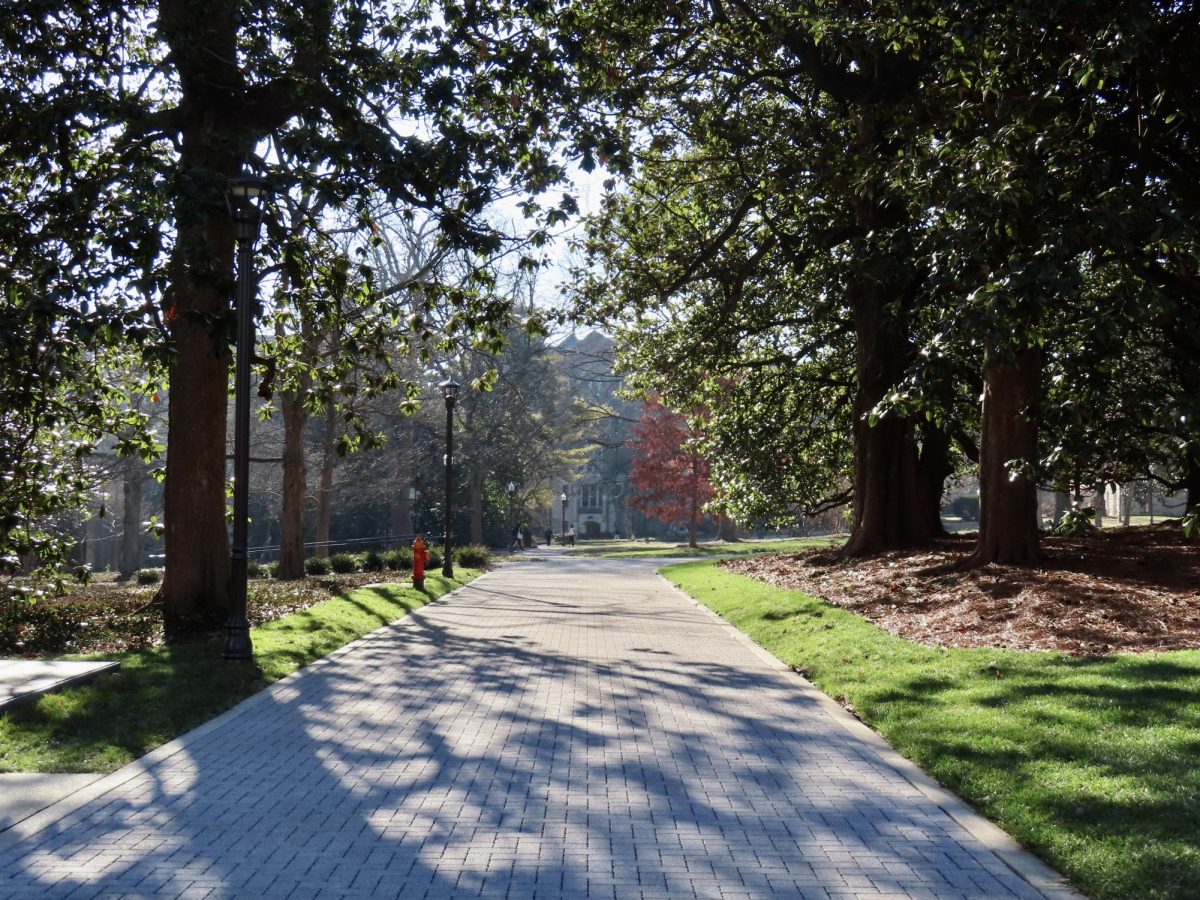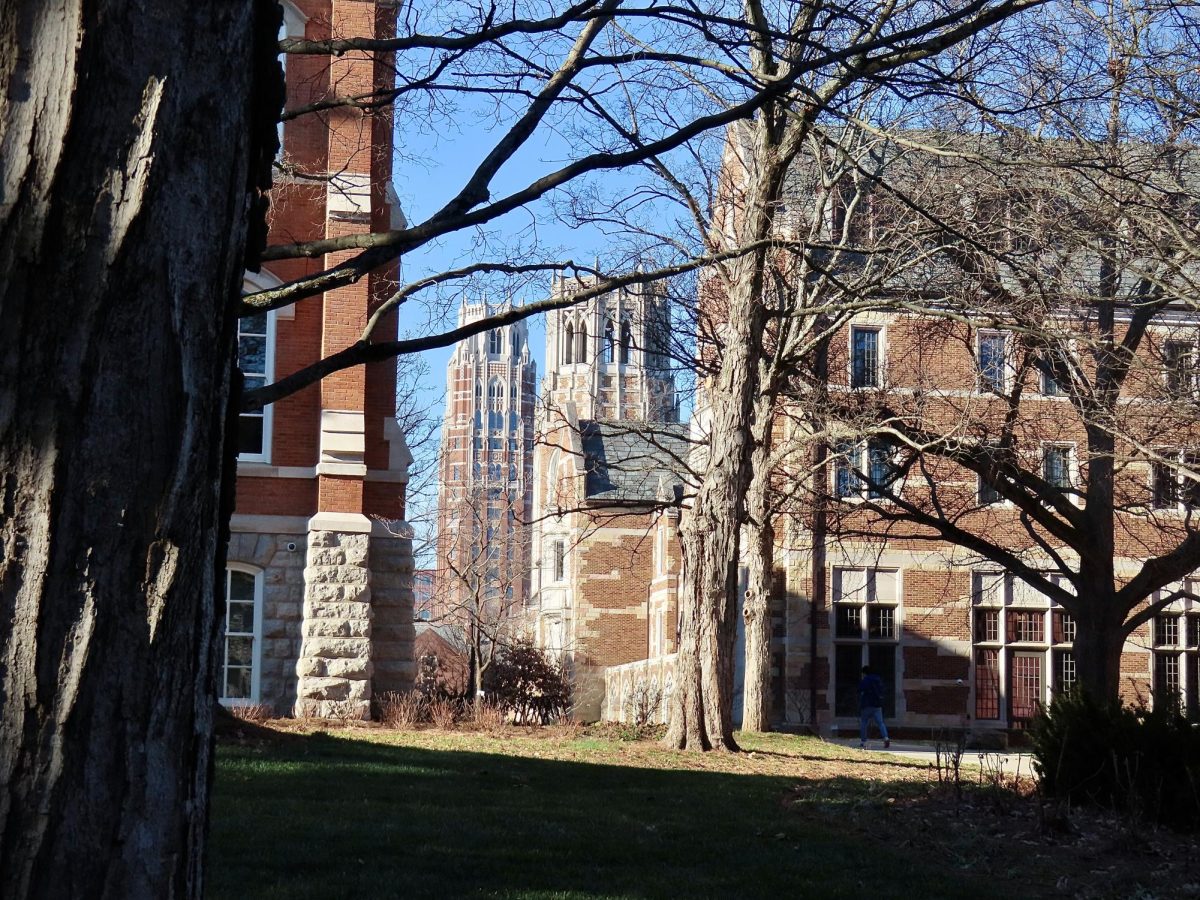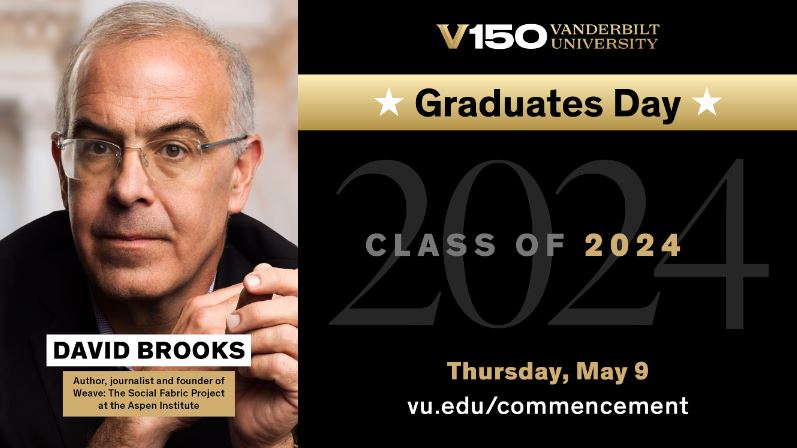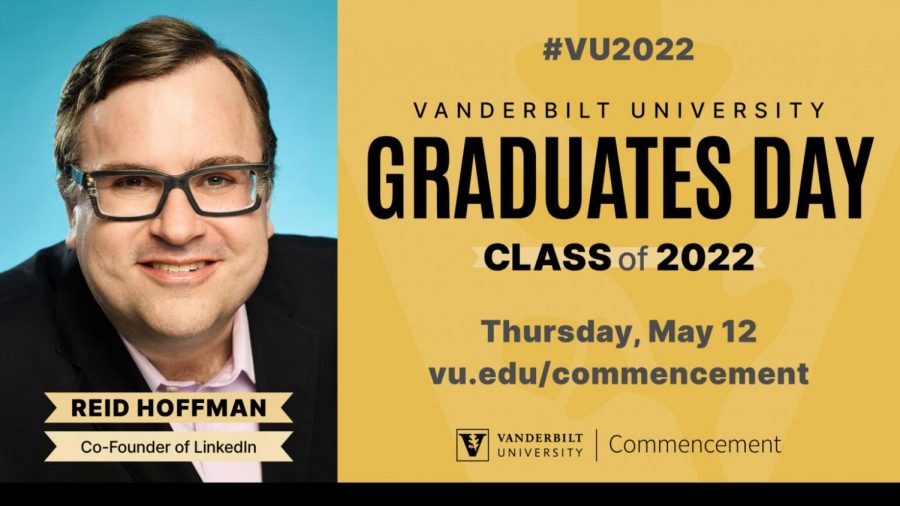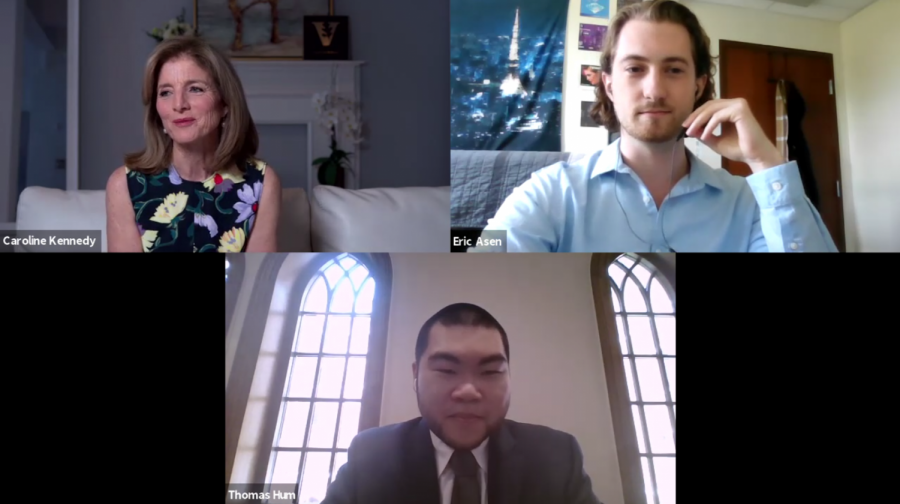On May 12, The Hustler spoke to Reid Hoffman, LinkedIn founder. Hoffman delivered the Graduates Day address for the Class of 2022’s commencement and received Vanderbilt’s Nichols-Chancellor’s Medal.
Hoffman is an entrepreneur, investor and book author. He earned a Bachelor of Science degree from Stanford University in 1990 and a master’s degree from Oxford University in 1993.
The Hustler: As the founder of LinkedIn, one of the world’s most prominent professional networking websites, what advice do you have for Vanderbilt graduates as they look towards entering the workforce?
Hoffman: I’ve written a book about this: ‘The Start-up Of You.’ What it says is to take an entrepreneurial mindset. This doesn’t mean that everyone needs to be an entrepreneur, but to have that view that volatility is increasing, not just related to the pandemic but everything. You need to be charting what your bold, entrepreneurial step will be, what your own personal path through the market will be. The fortunate thing is that life is a team sport, so your friends help you navigate that.
One of the things I say in ‘The Start-up Of You’ is that adaptability is the new stability. So when you’re looking for a reliable path forward, it’s about adopting a learning mindset and having a team of people helping you.
In addition to presenting this year’s Graduates Day address, you will also be receiving the Nichols-Chancellor’s Medal, which was previously awarded to Dr. Anthony Fauci, Venus Williams, Amal Clooney and Toni Morrison. How does it feel to be given this award?
It’s an amazing group to be a part of. One of the things that I think about amazing awards like this is that it’s a call to continuing action. You keep trying to live—for your entire life—such that you’re worthy of these sorts of honors. Part of the thing that, for example, we’re doing with the honorarium is Management Leaders for Tomorrow (MLT), which is an awesome organization trying to build the right economically inclusive futures. The short answer is that it’s an honor, and I hope to continue to aspire to be worthy.
You are currently a partner at the venture capital firm Greylock, which created a partnership with MLT in 2020. What do you believe are the best strategies for creating more diversity in the business and entrepreneurial fields, and what role do nonprofits like MLT play?
Not a surprise as the LinkedIn guy, I think networks are the best strategy. I think one of the really key things is: how do you build the network so that it’s diverse and inclusive? It’s part of the reason why we’ve built the partnership with Management Leaders for Tomorrow: Part of the way they do things is to make the network diverse and inclusive, and that will give people opportunities to become investors, opportunities to be founders and opportunities to join key growth industries like the tech industry.
When you look at challenges like this—this is one of the things I think I personally believe in and my other partners at Greylock do as well—when you look at systemic, deep problems, if you’re not working to be part of the solution, you’re part of the problem. Everyone says, ‘Do something,’ right? ‘Go make an effort.’ So we went out and looked at what things are to be done. We said building the network would be good. We at Greylock are doing a number of things in addition to MLT, such as 645 Ventures. There’s a whole list of things, but we start by building those networks so that the whole system becomes right.
You currently chair the advisory board for QuestBridge, an organization that provides full scholarships to low-income and first-generation college students. What do you believe is the importance of organizations like QuestBridge, and how would you like to see the organization develop in the future?
Ana McCullough has created an amazing organization with Questbridge. She’s the current CEO and executive director. What they do is not only scholarships; it’s also reaching out to low income communities and students who could really benefit from an amazing college education and making sure they know that is an option for them, making sure they know how their life can be opened.
It isn’t just, ‘Can I pay for it?’ Super important issue. But also, ‘Is it even for me?’ They even provide, once you get into college, that kind of community and network support, because it’s sometimes so alienating when they get there. What they’ve been focused on is not just college, but also the career post-college is work, and it’s part of the reason why they’re amazing innovators.
Do you have any advice for QuestBridge graduates as they enter into the next chapter of their lives?
It’s broadly the same advice I give everybody, which is to build a network, think entrepreneurially, realize that life is a team sport and engage people. When you might be coming from a less privileged background, it’s important, and it’s just the nature of the world, to work a little harder at building that network. Part of the thing that people frequently think is, ‘Well, I don’t have a network.’ But sometimes it’s your roommate, sometimes it’s the brother of your friend or the sister of your friend as a possible network connection that can open up that career path for you.
Why did you make philanthropy a focus in your life’s work, and how did you integrate philanthropy into your career and life?
I don’t really think of it as philanthropy. I think of it as having a meaningful life and having an impact on people. In everything you do, anything from choosing to fly to Nashville and participate in an event to being an entrepreneur and founding an organization to being a member of your local community, you should be thinking about, ‘How am I contributing to the world being a better place? How is that reflective of me and what I am doing?’ And it’s different for different people. Some people decide, ‘I’m really local to my community,’ and some people, like myself, go toward scalable models and technology companies and so forth. That’s essentially what I have been dedicated to.
There are blind spots to the commercial model. There are things that really need to happen in societies that the commercial model doesn’t necessarily take care of. One of the things I’ve been doing for years is the Second Harvest Food Bank of Silicon Valley because how do you help the most disadvantaged families? Make sure they have food. Kids will have better educational outcomes if they’re fed. It’s from that all the way to what you’re doing for technologies that may make a big difference in people’s lives.
How do you believe the pandemic and other forms of volatility, as you mentioned, have altered the job landscape? How does that make strategies such as understanding life to be a team sport more important?
Volatility will be the norm more than not going forward. Industries change. The kind of classic career paths and the way that things might have been done 10 years ago aren’t necessarily the way things are done now or will be done two years from now or four years from now. Sometimes it makes things harder. For example, the whole system was set up for in-person things and all of a sudden we’re doing all this stuff remote.
We just did a Masters of Scale live summit, and one of the career counselors at a college asked me, ‘Employers want virtual; the students and prospective employees want in-person. How do you solve that?’ The general advice, and this is one of the many details of how to look at your life strategy with an entrepreneur’s lens, is try your best to convert volatility, challenges and negatives to positives. What’s the way you play different? What’s the way you adapt? What’s the way that you can do something differently? Realize that things are changing. Realize that you need to learn the new change, but there isn’t an old rulebook. Again, life is a team sport, so have your friends help you with that. See if you can convert the change into something that may give you an even better opportunity.
Throughout your career, you have been an avid investor in new technologies, from AI transportation to cryptocurrency. Why have you chosen to invest in these kinds of startups, and what qualities do you think make a new technology more likely to be successful?
I bring a couple of lenses to my investing. One is, if it works, will it change the world at scale? Second, is that change something that makes the world the way it should be? For example, when I invested in Airbnb, there were 100 stays a week or something very small. But I was like, ‘Actually, this could be great for all of society.’ It could be great for the host, who could supplement their income, pay their rent, pay the mortgage. It’s good for the traveler; they get an interesting experience and people connect with the local community. So, those are the kinds of things I do now.
Then it gets to more pure tech things, for example, with AI, Web3 and crypto. Western banking is very expensive, so you think maybe you can bring Web3 and crypto to the rest of the world. Maybe you can bring it to a number of emerging market countries because participating in the electronic system could enable subsistence farmers in whatever country to begin to do business the same way they interact with their mobile phone. AI is going to transform all industries. We want to transform them in ways that are broadly helpful to society, so it’s about making sure you participate in those the right way.
How has your life path differed from what you envisioned it would be like when you received your own bachelor’s and master’s degrees? What advice do you have for graduates who may be looking into careers not wholly related to their academic field of study?
Well, not a surprise, but that will be one of the focuses of my speech today. In addition to the entrepreneurial mindset that I’ve spoken about so far, I would also say be experimental. Don’t think, ‘I have a month to set my entire life on its trajectory.’ Try things, and then adapt.
That’s essentially what I did. I thought, ‘let’s try academics and then let’s try the tech industry. Okay, let’s shift to entrepreneurship within the tech industry.’ If you told me before I’d gone back to the Valley that I was going to be part of the tech industry, I would have been surprised.
Answers have been edited for length and clarity.

